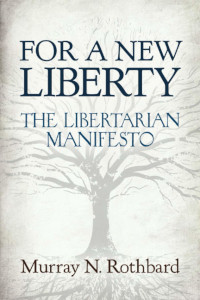For a New Liberty: The Libertarian Manifesto is a political philosophy book by Murray Rothbard, first published in 1973. It presents libertarianism from both a theoretical (non-agression axiom, property rights, etc.) and practical standpoint, suggesting how to apply the theory to deal with societal and economic problems. Its second edition, published in 1978, replaced the original first chapter, "The New Libertarian Movement", with a historical background titled "The Libertarian Heritage: The American Revolution and Classical Liberalism".
Review from LaissezFaireBooks.com, by James W. Harris, May 1989:
Murray N. Rothbard is an intellectual giant: a world-renowned economist, historian, political philosopher, iconoclast and raconteur who is widely recognized as one of the leading libertarian thinkers of our times.
He is also a masterful writer—passionate, rigorously logical, and always lively, with a special gift for making even the most complex issues understandable and interesting.
For a New Liberty is Rothbard's introduction to libertarianism, his Libertarian Manifesto. It is Rothbard at top form—a libertarian classic that for almost two decades has been hailed as the best general work on libertarianism available.
From the start, For a New Liberty is an exciting, exhilarating read. It begins with a fast overview of the historical roots of libertarianism: the Levellers, John Locke, classical liberalism, the American Revolution, and so on.
Rothbard packs an extraordinary amount of history in a few pages, and establishes libertarianism as the current, and most rigorous and consistent, manifestation of a centuries-long drive for personal and economic liberty.
Non-Aggression Axiom
Rothbard then defines modern libertarianism. It rests, he tells us, "upon one single axiom: that no man or group of men shall aggress upon the person or property of anyone else." He provides a short, masterful defense of that axiom, grounding it solidly in a philosophy of natural rights.
Having made the philosophical case for liberty, Rothbard—in one of the book's most powerful chapters—turns to a withering critique of the chief violator of liberty: the State. He unleashes a blistering assault upon the State's intellectual and moral underpinnings, denouncing it as a parasitical institution born of violence and living by violence. Layer by layer, he cuts away the obfuscations and euphemisms that for centuries have bamboozled the public into accepting even the State's worst depredations.
War, Rothbard shows, is merely a euphemism for mass murder; conscription, slavery, taxation, robbery; the "social contract"—which allegedly bonds us all even prenatally in eternal obligation to the State—a barbaric myth.
It's a breathtaking, impassioned demolition job. We see that not only is the emperor naked—he is a murderer, tyrant, brigand, liar and bungler.
And, Rothbard continues, the emperor is completely unnecessary, to boot. Rothbard devotes the lengthiest section of For a New Liberty to showing how the free market and voluntary human action can do a far more efficient and fair job of supplying all the worthwhile services we have been told only government can provide—including roads, schools, even police, courts and military defense. He provides penetrating libertarian solutions for many of today's most pressing problems, including inflation, pollution, poverty, war, threats to civil liberties, the education crisis, and others.
Libertarians are forever faced with a barrage of questions from the unconverted: What about the roads? What about the poor? What about—ad infinitum. Here are tough, succinct, innovative and convincing answers.
Intellectual Adventure
And always, reading Rothbard is a mindstretching intellectual adventure. For not only is he a brilliant scholar, he never flinches at taking the libertarian creed to its logical conclusions, no matter how controversial those conclusions may sometimes be. Indeed, For a New Liberty is such a trenchant challenge to conventional political nonsense that it deserves wider recognition as a masterpiece not only of libertarian thought, but of iconoclastic writing in general.
Finally, Rothbard maps out a strategy for achieving liberty, delving into ethics, tactics, education, abolitionism vs. gradualism, historical antecedents, and other crucial but generally neglected points. For a New Liberty ends on an upbeat, inspiring note, as Rothbard explains why he believes liberty will ultimately triumph over the forces of statism and collectivism. Hooray!
A Seminal Work
For a New Liberty gives the reader the invigorating feeling of contact with a truly original, razor-sharp mind. It's a seminal work, rich with insights and novel arguments. And it's written in a lively, vigorous style that makes most other political writing seem dreadfully dull and stodgy by comparison.
How important is For a New Liberty? Let's put it this way: every serious libertarian—indeed, anyone who is at all interested in libertarianism, for whatever reason—must be familiar with this book. It is that essential. If a copy of For a New Liberty—preferably worn with wear from repeat readings—is not on your bookshelf, or your friends' bookshelves, remedy that grave omission now.
If you would like to acquire an edition of this work, and thus help our work here at Freedom Circle, please click on the product image below:

